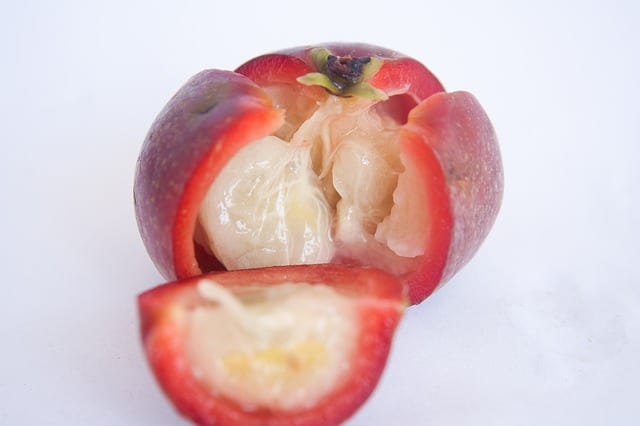Kokum is a fruit-bearing tree also known by its plant name Garcinia indica that offers benefits in food applications as well as industrial and pharmaceutical uses. You may also see it spelled Kokam or Aamsul and referred to as Garcinia indica Choisy. Technically kokum is the name of the fruit after it has been sun dried and has a sour but somewhat sweet aroma.
Kokum is largely grown in India and as a result it has a common use there and much of the research available originates in India, too. It is also grown in Thailand, Cambodia and China. It thrives in hot, humid conditions and when dried, the outer shell of the fruit can then be turned into butter, oil, juice, syrup, powder or paste for cuisine, industrial and medicinal uses. Leaves from the tree also have uses in medicine.
Food Uses
Kokum has long been used in India where it is widely grown and harvested in the warm summer months for a variety of culinary uses in both food and drink. In traditional Indian cuisine, kokum has long been used as a substitute for tamarind particularly in fish and other dishes.
Kokum is also popular in:
- Fruit drinks such as Kokum Mango and Kokum Sherbet.
- Osaman which is a hot soup-like dish similar to Rasam but less spicy, popular in Gujarat.
- Coconut-based curries, chutnies and soups as a substitute for tamarind in dishes that require a sweet/sour taste.
- In vegetable dishes that use potatoes and okra among others.
Industrial Uses
Another interesting use of kokum is in the place of – or in addition to – cocoa butter in chocolate production. While cocoa butter is commonly used as s fat, it can be difficult to use in hot climates as it softens with heat. Kokum fat can used in place of cocoa butter and while it doesn’t substantially change the composition or taste of the chocolate, helps to make the resulting chocolate more heat resistant.
As a result of its high melting point, kokum has also been used in the manufacture of ointments, lipsticks and lip balms as well as soap and skin lotions.
Pharmaceutical Uses
Garcinol is the major active ingredient in kokum which is used for its antioxidant properties with some belief that it also offers anti cancer benefits. Indian alternative medicine has long used the rind from the kokum fruit and the leaves from the tree for medicinal reasons to treat a wide variety of ailments.
Chemical studies have shown that the rind contains protein, tannin, pectin, sugars, fat, organic acids like (−)-hydroxycitric acid, hydroxycitric acid lactone and citric acid; the anthocyanins, cyanidin-3-glucoside and cyanidin-3-sambubioside; and the polyisoprenylated phenolics garcinol and isogarcinol.
Research Gate
Hydroxyl citric acid (HCA) in particular is widely found in kokum and is a common ingredient in many anti-obesity formulations. Recent research has yielded some preliminary positive results regarding the use of HCA for anti-obesity, fat reduction and appetite suppression purposes.
Kokum Health Benefits
Research has shown positive results for kokum used to treat depression.
Garcinia indica fruit rind, as a functional food, exhibited prominent antidepressant and anxiolytic effect, without impairing locomotor activity, expressing their non-involvement in CNS stimulation.
NCBI
Studies have preliminarily shown kokum to offer a number of health properties. Among perceived benefits, kokum is believed to be:
- Antibacterial
- Antifungal
- Anti-ulcerogenic
- Cardioprotective
- Anticancer
- Chemopreventive
- Antioxidant
- Anti-obesity (offering the effects of it along with an ability to suppress appetite).
Kokum Substitutes
While kokum when specified in a food recipe is your first choice, there are a few substitutes to consider when you’re in a pinch:
Tamarind: Generally considered the most popular souring agent in Indian cuisine because it is so widely available and grown in India. It also has a sweet/sour taste similar to kokum so it remains the popular substitute when possible.
Amchur (Amchoor): Also known as mango powder, it’s the go-to souring ingredient for many Indian vegetable dishes including lentil-based dishes. Sometimes, unripened mangoes are cut up and used to sour the dishes in India but short of that, mango powder may be substituted.
Lime juice: A sour citrus-based juice is last on the last but will provide sourness normally provided by kokum.

